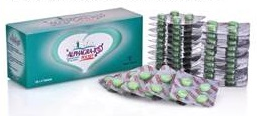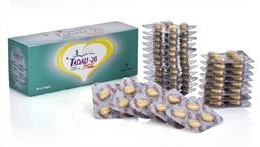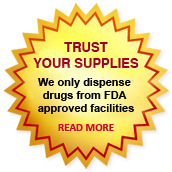Generic Hydroxychloroquine Sulphate Tablets (HQTOR By Torrent and HCQS by IPCA) - Product Information
Generic Hydroxychloroquine Sulphate Tablets (HQTOR By Torrent and HCQS by IPCA) are used to treat uncomplicated malaria due to P. Falciparum, P. Malariae, P. Ovale, and P. Vivax. Generic Hydroxychloroquine is also used for the treatment of chronic discoid lupus erythematosus and systemic lupus erythematosus in adults and for the treatment of acute and chronic rheumatoid arthritis in adults. Off-Label indications include the treatment of corona virus disease 2019 (COVID-19) and severe acute respiratory syndrome coronavirus2 (SARS-CoV-2) infection.
HCQS tablets are manufactured by IPCA Laboratories Limited, India in the strengths of 200 mg, 300 mg and 400 mg. HQTOR tablets are manufactured by Torrent Pharmaceuticals Limited, India in the strengths of of 200 mg, 300 mg and 400 mg. Both HCQS as well as HQTOR are generic version of Hydroxychloroquine Tablets. They are available for sale online at a low price of only $0.30 per pill. We also have in stock Lariago (Generic Chloroquine Phosphate tablets) which is also used to treat the same indications.
Name of the Drug
We supply original HCQS tablets are manufactured by IPCA Laboratories Limited, India or HQTOR tablets are manufactured by Torrent Pharmaceuticals Limited, India.
Manufacturer of HCQS Tablets
IPCA Laboratories Limited
Website: www.ipca.com
Manufacturer of HQTOR Tablets
Torrent Pharmaceuticals Ltd.
Website: www.torrentpharma.com
Active Ingredient present in HCQS and HQTOR Tablets
The active ingredient present in HCQS and HQTOR tablets is Hydroxychloroquine Sulphate. Each tablet contains 200 mg, 300 mg or 400 mg of Hydroxychloroquine Sulphate.
Uses of Generic Hydroxychloroquine Sulphate Tablets (HQTOR By Torrent and HCQS by IPCA)
Generic Hydroxychloroquine Sulphate Tablets (HQTOR By Torrent and HCQS by IPCA) is indicated for the suppressive treatment and treatment of acute attacks of malaria due to Plasmodium vivax, P. malariae, P. ovale, and susceptible strains of P. falciparum. It is also indicated for the prophylaxis of malaria in geographic areas where chloroquine resistance is not reported. Hydroxychloroquine Sulfate works by reducing inflammation in people with autoimmune diseases (this is where the body's immune system attacks itself by mistake) and hence is also used for:
- Treatment of acute and chronic Rheumatoid arthritis (inflammation of the joints) in adults.
- Treatment of Juvenile idiopathic arthritis (in combination with other therapies).
- Discoid and systemic lupus erythematosus (a disease of the skin or the internal organs).
- Skin problems which are sensitive to sunlight.
Mechanism of action
The precise mechanism by which Hydroxychloroquine exhibits activity against Plasmodium is not known. Hydroxychloroquine, like chloroquine, is a weak base and may exert its effect by concentrating in the acid vesicles of the parasite and by inhibiting polymerization of heme. It can also inhibit certain enzymes by its interaction with DNA.
Generic Hydroxychloroquine Sulphate Tablets ( HCQS and HQTOR) - Dosage
The adult dosage of Generic Hydroxychloroquine Sulphate Tablets ( HCQS and HQTOR) for various indications is given below:
Prophylaxis (Prevention) Of Malaria:
The adult dose is 400 mg once weekly on the same day of each week starting 2 weeks prior to exposure, and continued for 4 weeks after leaving the endemic area.
Treatment of Uncomplicated Malaria:
The adult dose is 800 mg followed by 400 mg at 6 hours, 24 hours and 48 hours after the initial dose (total 2000 mg Hydroxychloroquine Sulfate).
Lupus Erythematosus:
The recommended adult dosage is 200 to 400 mg daily, administered as a single daily dose or in two divided doses. Doses above 400 mg a day are not recommended. The incidence of retinopathy has been reported to be higher when this maintenance dose is exceeded.
Rheumatoid Arthritis (Initial Dose):
The action of hydroxychloroquine is cumulative and may require weeks to months to achieve the maximum therapeutic effect. The initial adult dosage is 400 mg to 600 mg daily, administered as a single daily dose or in two divided doses. In a small percentage of patients, side effects may require temporary reduction of the initial dosage.
Rheumatoid Arthritis (Maintenance Adult Dosage):
When a good response is obtained, the dosage may be reduced by 50 percent and continued at a maintenance level of 200 mg to 400 mg (155 mg to 310 mg base) daily, administered as a single daily dose or in two divided doses. Do not exceed 600 mg or 6.5 mg/kg per day, whichever is lower, as the incidence of retinopathy has been reported to be higher when this maintenance dose is exceeded.
Generic Hydroxychloroquine tablets ( HCQS and HQTOR) are cumulative in action when used in the treatment of Rheumatoid Arthritis and will require several weeks to exert its beneficial therapeutic effects, whereas minor side effects may occur relatively early. Several months of therapy may be required before maximum effects can be obtained.
Treatment Of Corona Virus Disease 2019 (COVID-19) Using Hydroxychloroquine Sulphate Tablets ( HCQS and HQTOR)
Hydroxychloroquine, which is used in autoimmune diseases such as rheumatoid arthritis and lupus, has also demonstrated in vitro antiviral activity against SARS-CoV-2.
Hydroxychloroquine was found to be more potent than chloroquine phosphate.Since the structure and mechanism of action of chloroquine and hydroxychloroquine (HCQ) are exactly same except an additional hydroxy moiety in one terminal in HCQ, both act as a weak base that can change the pH of acidic intracellular organelles including endosomes/lysosomes, essential for the membrane fusion. It is believed that both the agents could be effective tools against SARS-CoV-1 and SARS-CoV-2.
Chloroquine and Hydroxychloroquine appear to inhibit fusion of the virus to the cell membrane by modulating endosomal pH. These drugs also inhibit nucleic acid replication. Twenty-three clinical trials have been conducted in China to investigate the efficacy and safety of chloroquine and hydroxychloroquine in the treatment of COVID-19. Chloroquine phosphate has shown marked efficacy in the treatment of COVID-19 in more than 100 patients in terms of shortening hospital stay and improving clinical evolution, with few severe adverse reactions reported.
These findings led Chinese experts to recommend that patients with mild, moderate and severe COVID-19 who had no Chloroquine contraindications should be treated with Chloroquine Phosphate at a dose of 500 mg twice per day for 10 days.
Generic Hydroxychloroquine Tablets - Storage
Store Generic Hydroxychloroquine (HCQS and HQTOR tablets) at controlled room temperature (59°F to 86°F, 15°C to 30°C). Protect from light.
HCQS and HQTOR Tablets - Contraindications
HCQS and HQTOR tablets are contraindicated in patients with a hypersensitivity to Hydroxychloroquine Sulphate, 4-aminoquinoline compounds or any inactive ingredient present in tablets. This medication is also contraindicated in patients with a pre-existing maculopathy of the eye. Long-term therapy in children as well as administration of this medicine to children under 6 years of age is also contraindicated.
Warnings and Precautions
The warnings and precautions associated with the administration of Generic Hydroxychloroquine Sulphate Tablets (HQTOR and HCQS) are given below:
Resistant strains of malaria: Hydroxychloroquine sulfate is not effective against chloroquine-resistant strains of P. Falciparum.
Ocular: Irreversible retinal damage has been observed in some patients who had received hydroxychloroquine sulfate. Significant risk factors for retinal damage include daily doses of Hydroxychloroquine Sulfate greater than 6.5 mg/kg of actual body weight, durations of use greater than five years, subnormal glomerular filtration, use of some concomitant drug products such as Tamoxifen citrate and concurrent macular disease.
Cardiac Effects, including Cardiomyopathy and QT prolongation: Postmarketing cases of life-threatening and fatal cardiomyopathy have been reported with use of Hydroxychloroquine Sulfate as well as with use of Chloroquine.
Worsening of psoriasis and porphyria: Use of hydroxychloroquine sulfate in patients with psoriasis may precipitate a severe attack of psoriasis. When used in patients with porphyria the condition may be exacerbated.
Proximal Myopathy and Neuropathy: Skeletal muscle myopathy or neuropathy leading to progressive weakness and atrophy of proximal muscle groups, depressed tendon reflexes, and abnormal nerve conduction, have been reported.
Neuropsychiatric events, including suicidality: Suicidal behavior has been rarely reported in patients treated with Hydroxychloroquine Sulfate
Hypoglycemia: Hydroxychloroquine Sulfate has been shown to cause severe hypoglycemia including loss of consciousness that could be life threatening in patients treated with or without antidiabetic medications. Patients treated with Hydroxychloroquine Sulfate should be warned about the risk of hypoglycemia and the associated clinical signs and symptoms.
Use with caution in patients with gastrointestinal, neurological, or blood disorders, and in those with a sensitivity to quinine.
Antimalarial compounds should be used with caution in patients with hepatic disease or alcoholism or in conjunction with known hepatotoxic drugs.
Dermatologic reactions to Hydroxychloroquine Sulfate may occur and, therefore, proper care should be exercised when it is administered to any patient receiving a drug with a significant tendency to produce dermatitis.
Effects on Ability to Drive and Use Machinery
Patients should be warned about driving and operating machinery since Hydroxychloroquine Sulfate tablets (HCQS and HQTOR) can impair accommodation and cause blurring of vision. If the condition is not self-limiting, dosage may need to be temporarily reduced.
Hydroxychloroquine Sulphate (HCQS and HQTOR Tablets) Side Effects
Following the administration in doses adequate for the treatment of an acute malarial attack, mild and transient headache, dizziness, and gastrointestinal complaints (diarrhea, anorexia, nausea, abdominal cramps and, on rare occasions, vomiting) may occur. Cardiomyopathy has been rarely reported with high daily dosages of Hydroxychloroquine tablets.
The side effects of are given below:
Very Common: Abdominal pain, nausea Common (1 in 100 or higher and less than 1 in 10):
- Anorexia
- Affect lability
- Headache
- Diarrhoea
- vomiting
- Skin rashes
- pruritis
Uncommon (1 in 1000 or higher and less than 1 in 100):
- Dizziness
- Nervousness
- Dizziness
- Vertigo, tinnitus
- Abnormal LFTs
- Pigmentation disorders
- Sensory motor disorders
Side Effects of Unknown Frequency:
- Bone-marrow depression, anaemia, aplastic anaemia, agranulocytosis, leucopenia and thrombocytopenia
- Urticaria, angioedema, bronchospasm
- Hypoglycemia
- Hydroxychloroquine may precipitate or exacerbate porphyria.
- Convulsions have been reported with this class of drugs
- Extrapyramidal disorders such as dystonia, dyskinesia, tremor
- Bullous eruptions including erythema multiforme, Stevens-Johnson syndrome and toxic epidermal necrolysis, Drug Rash with Eosinophilia and Systemic Symptoms (DRESS syndrome) photosensitivity, exfoliative dermatitis, acute generalised exanthematous pustulosis (AGEP).
- AGEP has to be distinguished from psoriasis, although hydroxychloroquine may precipitate attacks of psoriasis. It may be associated with fever and hyperleukocytosis. Outcome is usually favourable after drug withdrawal.
- Cardiomyopathy
- Fulminant hepatic failure
- Myopathy
Ocular side effects of this medication include retinal toxicity, which can lead to permanent vision loss and deposition of the drug in the cornea. The mechanism of retinal toxicity is poorly understood. All patients should have an annual eye test by an optometrist. Formal ophthalmological examination must be considered if patients continue Hydroxychloroquine beyond 5 years.
Hydroxychloroquine Sulphate Tablets (HCQS and HQTOR) Overdosage
The 4-aminoquinoline compounds are very rapidly and completely absorbed after ingestion, and in accidental overdosage, or rarely with lower doses in hypersensitive patients, toxic symptoms may occur within 30 minutes. These consist of headache, drowsiness, visual disturbances, cardiovascular collapse, and convulsions, followed by sudden and early respiratory and cardiac arrest. The electrocardiogram may reveal atrial standstill, nodal rhythm, prolonged intraventricular conduction time, and progressive bradycardia leading to ventricular fibrillation and/or arrest.
Treatment is symptomatic and must be prompt with immediate evacuation of the stomach by emesis (at home, before transportation to the hospital) or gastric lavage until the stomach is completely emptied. If finely powdered, activated charcoal is introduced by the stomach tube, after lavage, and within 30 minutes after ingestion of the tablets, it may inhibit further intestinal absorption of the medicine.
To be effective, the dose of activated charcoal should be at least five times the estimated dose of Hydroxychloroquine that has been administered. Convulsions, if present, should be controlled before attempting gastric lavage. Because of the importance of supporting respiration, 5tracheal intubation or tracheostomy, followed by gastric lavage, may also be necessary. Exchange transfusions have been used to reduce the level of 4-aminoquinoline drug in the blood. A patient who survives the acute phase and is asymptomatic should be closely observed for a minimum period of at least six hours.
Hydroxychloroquine Sulphate (HCQS and HQTOR Tablets) During Pregnancy
Hydroxychloroquine Sulphate (HCQS and HQTOR tablets) has been classified by the US FDA as: Not formally assigned to a Pregnancy Category. It has been classified by the Australian FDA as Pregnancy Category D . Usage of Hydroxychloroquine Sulphate during pregnancy should be avoided except in the suppression or treatment of malaria when in the judgment of the physician the benefit outweighs the possible hazard. It should be remembered that radioactively-tagged chloroquine administered intravenously to pregnant, pigmented CBA mice passed rapidly across the placenta.
It accumulated selectively in the melanin structures of the fetal eyes and was retained in the ocular tissues for five months after the drug had been eliminated from the rest of the body. Embryonic deaths and malformations of anophthalmia and microphthalmia in the offspring have been reported when pregnant rats received large doses of chloroquine.
Do not use this medicine without your doctor's consent in case you are pregnant. Stop using this medication and inform your doctor immediately if you become pregnant during treatment.
Nursing Considerations
Caution should be exercised when administering Hydroxychloroquine Sulphate (HCQS and HQTOR tablets) to nursing women. It has been demonstrated that hydroxychloroquine administered to nursing women is excreted in human milk and it is known that infants are extremely sensitive to the toxic effects of 4-aminoquinolines.
Do not use this medication without telling your doctor if you are breast-feeding a baby.
Buy Generic Hydroxychloroquine Sulphate 200 mg, 300 mg & 400 mg Tablets (HQTOR By Torrent and HCQS by IPCA) Online at Only only $0.30 per Pill
You can buy Generic Hydroxychloroquine Sulphate tablets online from Clear Sky Pharmacy at a cheap price. HCQS tablets manufactured by IPCA Laboratories Limited, India as well as HQTOR tablets manufactured by Torrent Pharmaceuticals Limited, India are available in the strengths of 200 mg, 300 mg and 400 mg. They are supplied in a blister strip of 10 tablets. The 200 mg tablets cost only only $0.30 per unit when you place an order for 300 tablets.
Disclaimer
The above information is provided to the best of our knowledge and in good faith, it is without a warrant of any kind, expressed or implied.
Shipping Restriction
There are no Shipping restrictions for this product.







